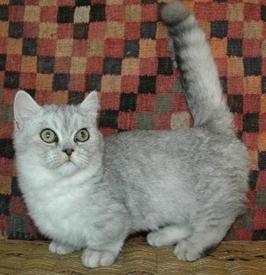
A relatively new breed that first emerged in 1996 through the careful breeding efforts of Joe Smith, a breeder of the low-to-the-ground Basset Hound, the Napoleon derived its name from Napoleon Bonaparte because of the leader’s own short stature. Joe Smith developed his breed by deliberately crossing the Persian with the Munchkin to produce the desirable traits of both in one cat. Precious little is known beside this, but rather than discredit Smith for his efforts to produce a short-legged cat, the criticism only fuelled the breed’s popularity, with demand increasing throughout the century.
Appearing as a domestic cat with a very round appearance and structure, the Napoleon is easily identified. Boasting short legs, inherited from the Munchkin, a ‘cobby’ body, a round, slightly pinched face and rounded-tip ears, wide eyes and a plush coat, the Napoleon is unlike any other breed. Whereas the Persian has a far more squashed facial appearance, the Napoleon’s nose is slightly longer and more like the traditional Persian breed. The Napoleon’s coat can be long or short-haired, permissible in all colour deviations, including chocolate, mink, lilac and pointed varieties. Despite its short legs, the Napoleon is not hindered when it comes to hunting and climbing, and is perfectly capable of doing the same activities as other cat breeds.
The Napoleon has a very pleasing temperament and makes a delightful addition to any household. Amiable, affectionate and loyal, the Napoleon forms strong attachments to its humans and has a huge capacity for love and companionship. Generally speaking, a healthy Napoleon is full of personality, life and humour and has a natural love for children. If this cat is to be housed exclusively indoors, ensure you provide a variety of interactive toys and playthings to keep it occupied during the day. This breed can weigh up to 10 pounds, with a typical life expectancy of 12-15 years when cared for accordingly.
Some people speculate that the Napoleon’s short legs make it more susceptible to spinal defects and joint issues, although research does not support this. Generally speaking, the Napoleon is a healthy and resilient breed.
Do you own a Napolean? Let others know what they're like!
Related products
Advantage 80 Spot On Flea Control Large Cats and Rabbits
from £10.89
Advantage 40 Spot On Flea Control Cats, Small Dogs and Rabbits
from £10.89
Advantage 100 Spot On Flea Control Medium Dog
from £10.89
Advantage 250 Spot On Flea Control Large Dog
from £10.89
Drontal Tasty Bone Wormer Tablets for Small & Medium Dogs (2 to 20kg)
from £1.83
FRONTLINE Plus Flea & Tick Treatment Dogs & Cats
from £17.49
TermaWorm™ Tablets for Cats & Dogs
from £1.59
Drontal Tasty Bone XL Wormer Tablets for Large Dogs (Over 20kg)
from £5.43